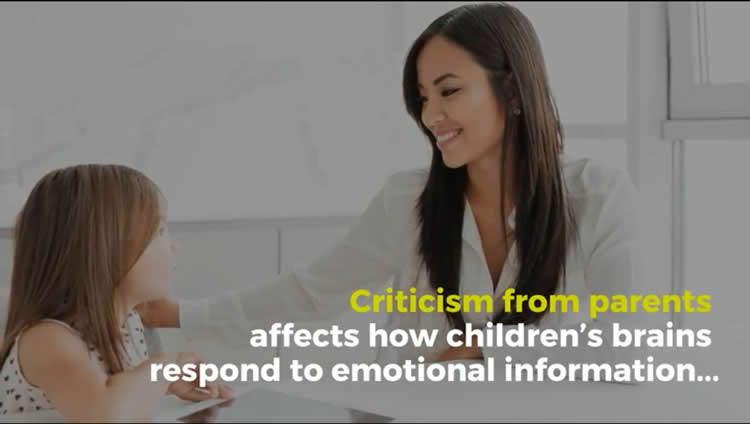Summary: A new study reveals children show less attention to emotional facial expressions if their parents are highly critical.
Source: Binghamton University.
Children of highly critical parents show less attention to emotional facial expressions, according to new research from Binghamton University, State University at New York.
“These findings suggest that children with a critical parent might avoid paying attention to faces expressing any type of emotion,” said Kiera James, graduate student of psychology at Binghamton University, and lead author of the paper. “This behavior might affect their relationships with others and could be one reason why children exposed to high levels of criticism are at risk for things like depression and anxiety.”
The researchers wanted to examine how exposure to parental criticism impacts the way that children process and pay attention to facial expressions of emotion. One way to look at attention is through a neural marker called the Late Positive Potential (LPP), which provides a measure of how much someone is paying attention to emotional information, such as a face that is happy or sad.

James and fellow researchers had parents of 7 to 11-year-old children talk about their child for five minutes. These statements were later coded for levels of criticism. They also measured the brain activity of the children as they viewed a series of pictures of faces showing different emotions. The researchers found that children of highly critical parents displayed less attention to all of the emotional facial expressions than children of parents displaying low levels of criticism.
“We know from previous research that people have a tendency to avoid things that make them uncomfortable, anxious, or sad because such feelings are aversive. We also know that children with a critical parent are more likely to use avoidant coping strategies when they are in distress than children without a critical parent,” said James. “Given this research, and our findings that children with a critical parent pay less attention to all emotional facial expressions than children without a critical parent, one possible explanation is that the children with a critical parent avoid looking at any facial expressions of emotion. This may help them avoid exposure to critical expressions, and, by extension, the aversive feelings they might associate with parental criticism. That said, it may also prevent them from seeing positive expressions from others.”
Children of highly critical parents show less attention to emotional facial expressions, according to new research from Binghamton University, State University at New York.
The researchers hope to follow up these results with another study examining what happens in the brains of children in real time when they are receiving positive and negative comments from their parents.
Funding: This research was supported by the National Institute of Mental Health grant MH098060 awarded to B.E. Gibb. The authors thank Katie Burkhouse, Anastacia Kudinova, Aliona Tsypes, Cope Feurer, Sydney Meadows, Michael Van Wie, Devra Alper, Eric Funk, Effua Sosoo, Nathan Hall, Aholibama Lopez, and Kristina Wong for their help in conducting assessments for this project.
Source: Binghamton University
Publisher: Organized by NeuroscienceNews.com.
Image Source: NeuroscienceNews.com image is apated from the Binghamton University video.
Video Source: Abstract to Binghamton University.
Original Research: Abstract for “Parental Expressed Emotion-Criticism and Neural Markers of Sustained Attention to Emotional Faces in Children” by Kiera M. James, Max Owens, Mary L. Woody, Nathan T. Hall & Brandon E. Gibb in Journal of Clinical Child & Adolescent Psychology. Published May 2 2018
doi:10.1080/15374416.2018.1453365
[cbtabs][cbtab title=”MLA”]Binghamton University “Parental Criticism Impacts How Children’s Brains Respond to Emotional Information.” NeuroscienceNews. NeuroscienceNews, 11 June 2018.
<https://neurosciencenews.com/parental-criticism-child-emotion-9307/>.[/cbtab][cbtab title=”APA”]Binghamton University (2018, June 11). Parental Criticism Impacts How Children’s Brains Respond to Emotional Information. NeuroscienceNews. Retrieved June 11, 2018 from https://neurosciencenews.com/parental-criticism-child-emotion-9307/[/cbtab][cbtab title=”Chicago”]Binghamton University “Parental Criticism Impacts How Children’s Brains Respond to Emotional Information.” https://neurosciencenews.com/parental-criticism-child-emotion-9307/ (accessed June 11, 2018).[/cbtab][/cbtabs]
Abstract
Parental Expressed Emotion-Criticism and Neural Markers of Sustained Attention to Emotional Faces in Children
There is growing evidence for the role of environmental influences on children’s information-processing biases for affectively salient stimuli. The goal of this study was to extend this research by examining the relation between parental criticism (expressed emotion-criticism, or EE-Crit) and children’s processing of facial displays of emotion. Specifically, we examined the relation between EE-Crit and children’s sensitivity in detecting facial displays of emotion. We also examined a neural marker of sustained attention, the late positive potential (LPP) event-related potential component (ERP). Participants were 87 children (ages 7–11 years; 53.3% female, 77.8% Caucasian) and their parents (ages 24–71; 90% female, 88.9% Caucasian). Parents completed the Five-Minute Speech Sample to determine levels of EE-Crit toward their child. Children completed a morphed faces task during which behavioral and ERP responses were assessed. Although there were no group differences in sensitivity in detecting facial displays of emotion, we found that children of parents exhibiting high, compared to low, EE-Crit displayed less attention (smaller LPP magnitudes) to all facial displays of emotion (fearful, happy, sad). These results suggest that children of critical parents may exhibit an avoidant pattern of attention to affectively-salient interpersonal stimuli.






